外研版英语七年级下册 Revision Module B 一般过去时复习课件(27张PPT)
文档属性
| 名称 | 外研版英语七年级下册 Revision Module B 一般过去时复习课件(27张PPT) |
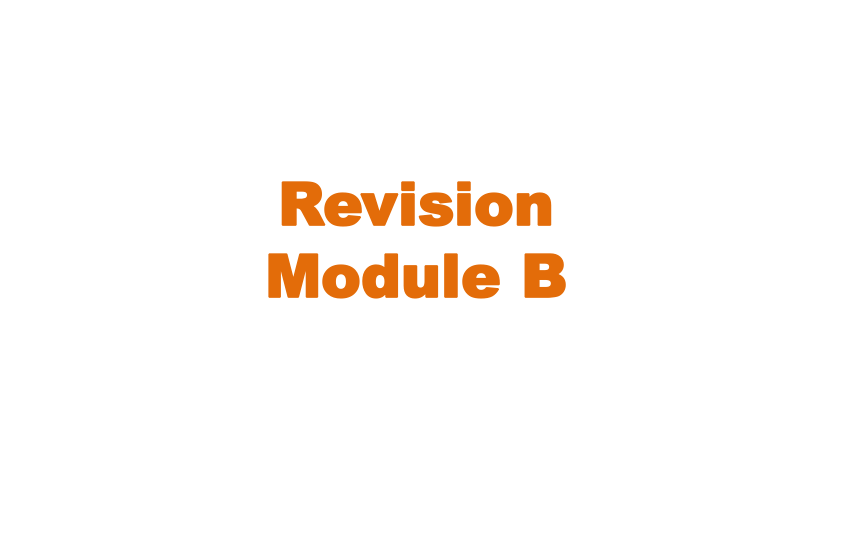
|
|
| 格式 | zip | ||
| 文件大小 | 5.6MB | ||
| 资源类型 | 教案 | ||
| 版本资源 | 外研版 | ||
| 科目 | 英语 | ||
| 更新时间 | 2019-05-08 00:00:00 | ||
图片预览

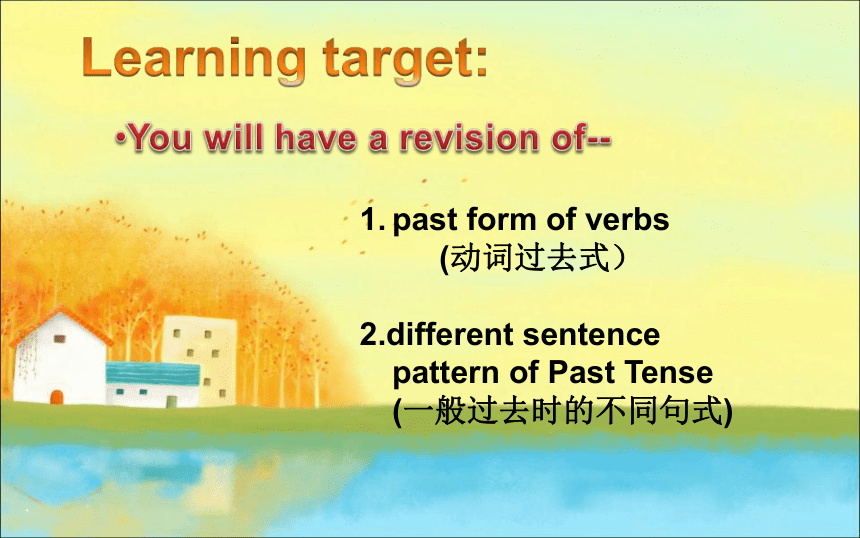


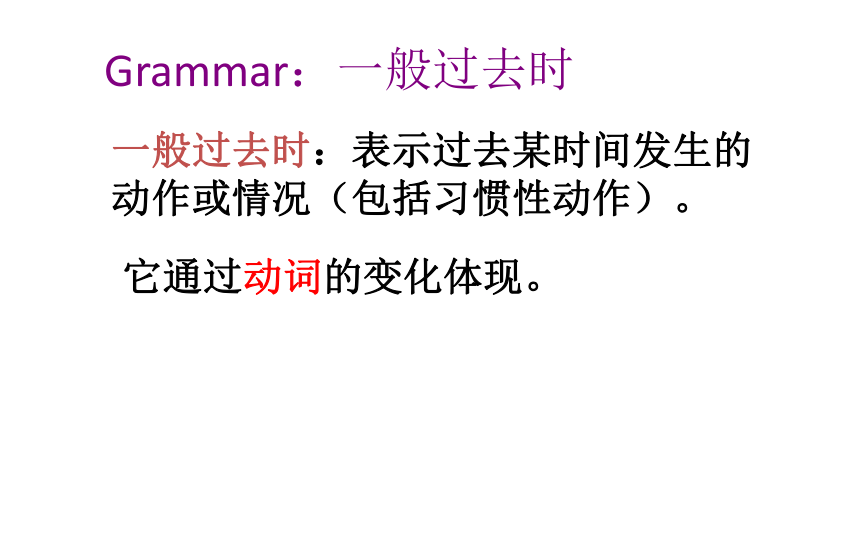
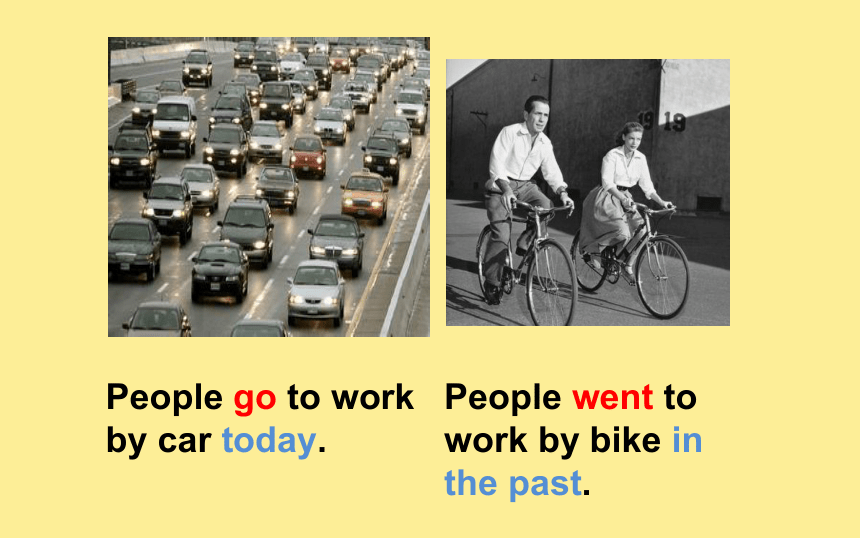
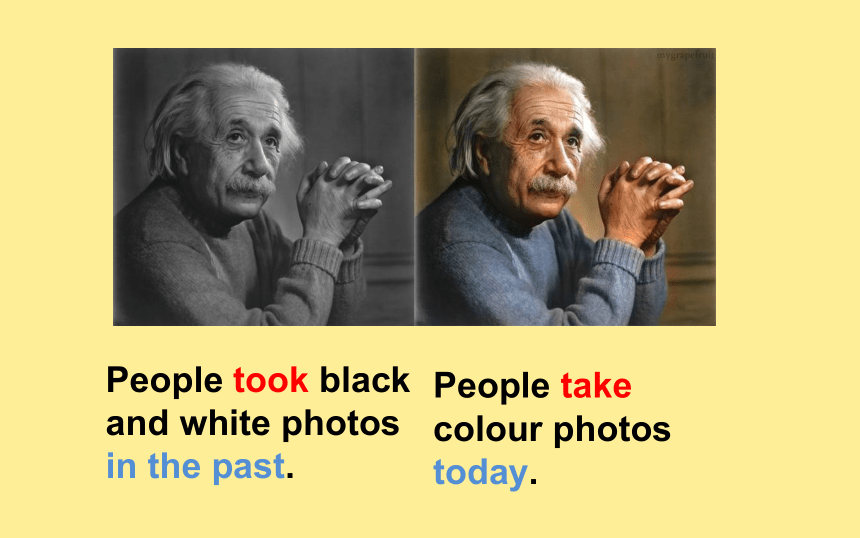


文档简介
Revision Module B
past form of verbs
(动词过去式)
2.different sentence pattern of Past Tense (一般过去时的不同句式)
点击添加文本
点击添加文本
点击添加文本
点击添加文本
What tense do I use in my travel diary?
2. Who has the best memory? Try to remember all
the verbs in the video.
Grammar:一般过去时
一般过去时:表示过去某时间发生的动作或情况(包括习惯性动作)。
它通过动词的变化体现。
People go to work by car today.
People went to work by bike in the past.
People take colour photos today.
People took black and white photos in the past.
People listen to the music on the computer today.
People listened to the music on the radio in the past.
arrive---arrived
sit---sat
go---went
see---saw
stand---stood
relax---relaxed
visit---visited
take---took
walk---walked
enjoy---enjoyed
look---looked
draw---drew
meet---met
have---had
is---was
send---sent
wait---waited
点击添加文本
点击添加文本
点击添加文本
点击添加文本
动词一般过去式的变法
特殊变化
结尾是e不发音,
直接加d
一般直接加-ed
look---looked
listen---listened
arrive---arrived
like---liked
go---went
win---won
点击添加文本
点击添加文本
点击添加文本
点击添加文本
动词一般过去式的变法
去y变i加-ed
“双写加”
stop---stopped
study---studied
try---tried
辅音加y结尾
Complete the passage with the correct form of the words and expression.
be born become come die find go
like move read travel try write
Hans Christian Andersen was a famous writer of
stories for children. He (1)________ into a poor family in Denmark in 1805. His father (2) ______ when the boy was eleven. Hans (3) _____ a few jobs. Finally, at the age of fourteen, he (4) ________ to the capital of Denmark to work in the theatre. Then he (5)_____ on to study and later he (6)__________
around Europe.
was born
died
tried
moved
went
travelled
His first book (7) _____ out in 1822. He (8)______ many stories for children, but older people also (9) ______ them interesting. Many of his stories (10) _____ very famous, like The Ugly Duckling and The Little Match Girl. People still (11)____ to read them today and they can (12) ____ them in many languages.
came
wrote
found
became
like
read
①
Questions:
When did Fiona arrive at Qingdao?
2. Who is Carol?
3. Did Carol sit on the rock in Zhanqiao Park?
4. Who did Fiona meet yesterday? Where did they eat?
5. What did Fiona send to Matt, a present or a postcard?
Fiona arrived on Friday afternoon.
She is Fiona’s roommate.
No, she didn’t.
She met her old classmate and had dinner together in a Korean restaurant.
She sent a nice postcard to Matt.
点击添加文本
点击添加文本
点击添加文本
点击添加文本
肯定句
否定句
一般疑问句及回答
特殊疑问句
e.g. He wrote a letter to his parents yesterday.
The journey was wonderful.
Mary’s uncle and aunt cooked lunch for us.
The students were very happy.
实义动词
Be动词
肯定句:
e.g. He didn’t write a letter to his parents yesterday.
Mary’s uncle and aunt didn’t cook lunch for us.
与did可缩写成didn’t
e.g. The journey was not wonderful. (wasn’t)
The students were not very happy. (weren’t)
与be动词过去式也可缩写
否定句: ( be 动词)
e.g. Did he write a letter to his parents yesterday?
Did Mary’s uncle and aunt cook lunch for us?
肯定回答:Yes, 主语+did.
否定回答:No, 主语+didn’t.
e.g. Was the journey wonderful?
Were the students very happy?
肯定回答:Yes, 主语+相应be动词过去式.
否定回答:No, 主语+相应be动词过去式+not.
一般疑问句: (be 动词)
回答:要求用完整的句子回答。如:
She was born in Tianjin.
She studied in Tonglou Middle School.
e.g. Where was she born ?
Which school did she study last year?
特殊疑问句:
点击添加文本
点击添加文本
点击添加文本
点击添加文本
Discuss about what you did last week.
For example: (You can also add questions.)
Did you go to school?
When did you
go to school?
Did anything
interesting
happen in school?
What did you
learn in your
favourite class?
Did you do
sports
at school?
What did you do
last weekend?
动词过去式的变法:
加ed,加d,双写加ed,
变y为i加ed,不规则变化
一般过去时:
表示过去某时间发生的动作或情况(包括习惯性动作)。
一般过去时的不同句式
past form of verbs
(动词过去式)
2.different sentence pattern of Past Tense (一般过去时的不同句式)
点击添加文本
点击添加文本
点击添加文本
点击添加文本
What tense do I use in my travel diary?
2. Who has the best memory? Try to remember all
the verbs in the video.
Grammar:一般过去时
一般过去时:表示过去某时间发生的动作或情况(包括习惯性动作)。
它通过动词的变化体现。
People go to work by car today.
People went to work by bike in the past.
People take colour photos today.
People took black and white photos in the past.
People listen to the music on the computer today.
People listened to the music on the radio in the past.
arrive---arrived
sit---sat
go---went
see---saw
stand---stood
relax---relaxed
visit---visited
take---took
walk---walked
enjoy---enjoyed
look---looked
draw---drew
meet---met
have---had
is---was
send---sent
wait---waited
点击添加文本
点击添加文本
点击添加文本
点击添加文本
动词一般过去式的变法
特殊变化
结尾是e不发音,
直接加d
一般直接加-ed
look---looked
listen---listened
arrive---arrived
like---liked
go---went
win---won
点击添加文本
点击添加文本
点击添加文本
点击添加文本
动词一般过去式的变法
去y变i加-ed
“双写加”
stop---stopped
study---studied
try---tried
辅音加y结尾
Complete the passage with the correct form of the words and expression.
be born become come die find go
like move read travel try write
Hans Christian Andersen was a famous writer of
stories for children. He (1)________ into a poor family in Denmark in 1805. His father (2) ______ when the boy was eleven. Hans (3) _____ a few jobs. Finally, at the age of fourteen, he (4) ________ to the capital of Denmark to work in the theatre. Then he (5)_____ on to study and later he (6)__________
around Europe.
was born
died
tried
moved
went
travelled
His first book (7) _____ out in 1822. He (8)______ many stories for children, but older people also (9) ______ them interesting. Many of his stories (10) _____ very famous, like The Ugly Duckling and The Little Match Girl. People still (11)____ to read them today and they can (12) ____ them in many languages.
came
wrote
found
became
like
read
①
Questions:
When did Fiona arrive at Qingdao?
2. Who is Carol?
3. Did Carol sit on the rock in Zhanqiao Park?
4. Who did Fiona meet yesterday? Where did they eat?
5. What did Fiona send to Matt, a present or a postcard?
Fiona arrived on Friday afternoon.
She is Fiona’s roommate.
No, she didn’t.
She met her old classmate and had dinner together in a Korean restaurant.
She sent a nice postcard to Matt.
点击添加文本
点击添加文本
点击添加文本
点击添加文本
肯定句
否定句
一般疑问句及回答
特殊疑问句
e.g. He wrote a letter to his parents yesterday.
The journey was wonderful.
Mary’s uncle and aunt cooked lunch for us.
The students were very happy.
实义动词
Be动词
肯定句:
e.g. He didn’t write a letter to his parents yesterday.
Mary’s uncle and aunt didn’t cook lunch for us.
与did可缩写成didn’t
e.g. The journey was not wonderful. (wasn’t)
The students were not very happy. (weren’t)
与be动词过去式也可缩写
否定句: ( be 动词)
e.g. Did he write a letter to his parents yesterday?
Did Mary’s uncle and aunt cook lunch for us?
肯定回答:Yes, 主语+did.
否定回答:No, 主语+didn’t.
e.g. Was the journey wonderful?
Were the students very happy?
肯定回答:Yes, 主语+相应be动词过去式.
否定回答:No, 主语+相应be动词过去式+not.
一般疑问句: (be 动词)
回答:要求用完整的句子回答。如:
She was born in Tianjin.
She studied in Tonglou Middle School.
e.g. Where was she born ?
Which school did she study last year?
特殊疑问句:
点击添加文本
点击添加文本
点击添加文本
点击添加文本
Discuss about what you did last week.
For example: (You can also add questions.)
Did you go to school?
When did you
go to school?
Did anything
interesting
happen in school?
What did you
learn in your
favourite class?
Did you do
sports
at school?
What did you do
last weekend?
动词过去式的变法:
加ed,加d,双写加ed,
变y为i加ed,不规则变化
一般过去时:
表示过去某时间发生的动作或情况(包括习惯性动作)。
一般过去时的不同句式
同课章节目录
- Module 1 Lost and found
- Unit 1 Whose bag is this?
- Unit 2 Are they yours?
- Unit 3 Language in use
- Module 2 What can you do ?
- Unit 1 I can play the piano
- Unit 2 I can run really fast
- Unit 3 Language in use
- Module 3 Making plans
- Unit 1 What are you going to do at the weekends?
- Unit 2 We're going to cheer the players.
- Unit 3 Language in use
- Module 4 Life in the future
- Unit 1 Everyone will study at home
- Unit 2 Every family will have a small plane.
- Unit 3 Language in use
- Module 5 Shopping
- Unit 1 What can I do for you?
- Unit 2 You can buy everything on the Internet
- Unit 3 Language in use
- Module 6 Around town
- Unit 1 Could you tell me how to get to the Nationa
- Unit 2 The London Eye is on your right.
- Unit 3 Language in use
- Revision module A
- Module 7 My past life
- Unit 1 I was born in a small village.
- Unit 2 I was born in Quincy.
- Unit 3 Language in use
- Module 8 Story time
- Unit 1 Once upon a time….
- Unit 2 Goldilocks hurried out of the house.
- Unit 3 Language in use
- Module 9 Life history
- Unit 1 He left school and began work at the age of
- Unit 2 He decided to be an actor.
- Unit 3 Language in use
- Module 10 A holiday journey
- Unit 1 What did you do?
- Unit 2 This morning we took a walk.
- Unit 3 Language in use
- Module 11 Body language
- Unit 1 They touch noses!
- Unit 2 Here are some ways to welcome them.
- Unit 3 Language in use
- Module 12 Western music
- Unit 1 It's so beautiful!
- Unit 2 Vienna is the centre of European classical
- Unit 3 Language in use
- Revision module B
